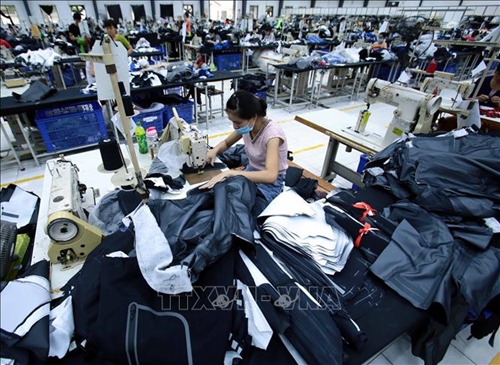Vietnam is likely to remain a priority in the LP’s policy given three key elements, Sophia Leong, Advisory Board Member of the Canada - ASEAN Initiatives, told Vietnam News Agency correspondent in Ottawa.
Firstly, she said, Vietnam’s economy is resilient, and we saw it firsthand with Vietnam’s economy expanding to close to 3 percent in 2020, which is one of the highest in the world during COVID-19, an economically challenging period.
    |
 |
|
At Kydo Vietnam Garment Company in Pho Noi A industrial park in Hung Yen |
Secondly, Vietnam’s rapid expansion of its middle class further provides a much-needed economic stability and trade stability as both of our economies must adjust to growth impacts of the fourth industrial revolution, she continued.
Finally, the pandemic has accelerated the digital transformation, and both of the economies are aggressively adjusting to the new normal, she pointed out. Vietnam is poised to embrace a digital economy faster than other nations in Southeast Asia and a recent report from Temasek acknowledge Vietnam’s digital economy as “a dragon being unleashed.”
“Vietnam is aggressively building key pillars necessary for a digital economy – Connectivity, Logistics, Digital Payment and Skill Talent,” Leong added. “The benefit of a young population in Vietnam is its entrepreneurship aspiration and their ability to learn, to adopt and to innovate. This is where Canada could have key roles and impact.”
As the Liberals were re-elected, there will be a steady increase of attention to the Indo-Pacific and a continued emphasis to develop a strategy for the Indo-Pacific region, said J. Berkshire Miller, Director and Senior Fellow on Indo-Pacific at Ottawa-based Macdonald Laurier Institute.
“This is a shared priority from both main parties in Canada,” he noted.
Echoing Miller’s view, Assoc. Prof. Ian Lee of Sprott School of Business, Carleton University, said both major Canadian political parties want to diversify Canada’s trading relationships.
Additionally, as Canada and Vietnam are signatories to the Comprehensive and Progressive Agreement for Trans-Pacific Partnership (CPTPP), this will increasingly become the vehicle or medium or path for enhanced trade between the two countries.
According to Lee, Vietnam has been Canada’s largest trading partner in ASEAN since 2015.
Global Affairs Canada has said in a statement that since Canada faces growing calls to diversify its relationships in Asia and develop a clear comprehensive Indo-Pacific strategy, it can further build on its relationship with Vietnam as exporters and importers now enjoy increased market access and tariff reduction in this trading environment.
In 2020, the two-way trade expanded 12.8 percent against 2019, and the figure spurred 38.5 percent in the first half of this year.
Canada and Vietnam have had strong relationships since the early 1970’s and along the way built in partnerships and trade agreements.
Trudeau’s administration is believed to continue its interactive foreign policy with Southeast Asia and Vietnam will be among Canada’s strategic partners in the region.
Source: VNA